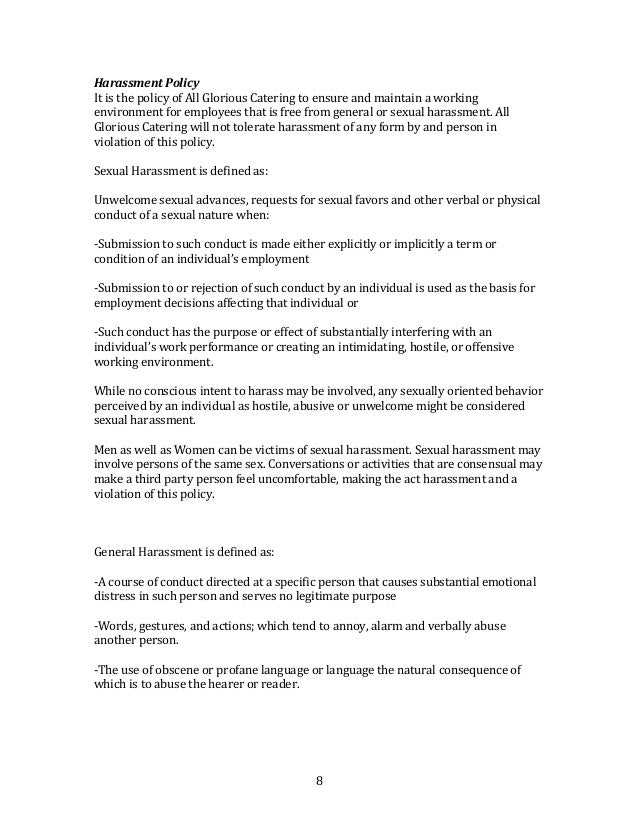Walmart Employee Handbook Bereavement Policy

A bereavement leave policy is the description of the company’s practices in allowing paid and unpaid employee time off from work when a family member, relative, or friend dies. The other 49 states, plus the District of Columbia, do not require employers to provide employees either paid or unpaid bereavement leave. Employers, at their discretion, may maintain bereavement leave policies or practices and, in certain circumstances, may be obligated to comply with their established policy or practice.
User 1: I was a Cashier and they started me at $6.50. User 2: I started out at $7.75 an hour in Illinois. I believe you get a little 40-60cent raise for ever year you're with the company.unless you get promoted to a higher job/dept then you'll get a bit more. User 3: no, not in Georgia d kablack: I started out at $8.00 an hour due to my previous experience as a cashier and I had a job already, if you leave your current job to work at Walmart they are willing to pay you a bit more.
Many will start out around $7.25 which is the federal minimum wage set in July 2008 (?) I make $10 per hour working third shift. R.J.: My brother works with a door greeter that has been with the company (In Florida) for about 40 years. He makes over $50 an hour, no that wasn't a typo. They've now changed the policy so that the job 'tops out' at around $24 an hour. The man has refused every job promotion offered to him, who could blame him?
Making that kind of money to say hello to everyone? I'll take it! Nbme step 2 ck form 6 offline printer reviews.
Fact Sheet: Leave for Funerals and Bereavement Funeral Leave for Combat-Related Death of an Immediate Relative An employee is entitled to up to 3 workdays of funeral leave to make arrangements for or to attend the funeral of an immediate relative who died as a result of wounds, disease, or injury incurred while serving as a member of the Armed Forces in a combat zone. If the employee provides satisfactory reasons, the 3 workdays do not need to be consecutive. • Armed Forces means the Army, Navy, Air Force, Marine Corps, and Coast Guard, and includes the Reserve components, National Guard, and Air National Guard. • Combat zones are areas the President designates by Executive order, in accordance with section 112 of the Internal Revenue Code, as areas in which the Armed Forces are engaging or have engaged in combat.
Fgds zaklyuchenie norma. Comment2, Rockable_building_wordpress_themes_from_scratch_torrent_view, >:-(((, New_dawn_prokhozhdenie_na_telefone,:O, skachat_igru_stalker_ten_chernobylia_avto_zona_cherez_torrent,%-]]], Skachat_driver_updater_s_kliuchom_na_russkom_iazyke, 372, gdz_po_fizike_9_klass_kabardin_uchebnik, cxg, https://storify.com/abprotlete/the-lake-house-par.
Current areas designated as combat zones can be found in • Immediate relative covers a wide range of relationships, including spouse; parents; parents-in-law; children; brothers; sisters; grandparents; grandchildren; step parents; step children; foster parents; foster children; guardianship relationships; same sex and opposite sex domestic partners; and spouses or domestic partners of the aforementioned, as applicable. The list of immediate relatives for whom an employee may request funeral leave (as well as important associated definitions for the terms son or daughter, parent, domestic partner, and committed relationship) may be found in the fact sheet entitled. Note: When an employee requests funeral leave for a combat-related death of an immediate relative, the agency may require the employee to document his or her relationship to that immediate relative. Agencies should establish consistent rules and follow the same documentation requirements for all relationships, but agencies have authority to request additional information in cases of suspected leave abuse.

References • 5 U.S.C. 6326, 5 CFR 630, subpart H Funeral Leave for First Responders A Federal law enforcement officer or firefighter may be excused from duty without loss of pay or charge to leave to attend the funeral of a fellow Federal law enforcement officer or firefighter who was killed in the line of duty. References • 5 U.S.C.